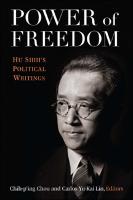Power of Freedom
External Review of Whole Manuscript
Hu Shih's Political Writings
| dc.contributor.editor | Chou, Chih-Ping | |
| dc.contributor.editor | Lin, Carlos | |
| dc.date.accessioned | 2022-10-13T13:29:32Z | |
| dc.date.available | 2022-10-13T13:29:32Z | |
| dc.date.issued | 2022 | |
| dc.identifier | OCN: 1341297855 | |
| dc.identifier.uri | https://library.oapen.org/handle/20.500.12657/58606 | |
| dc.description.abstract | Dr. Hu Shih (1891–1962) was one of China’s top scholars and diplomats and served as the Republic of China’s ambassador to the United States during World War II. As early as 1941, Hu Shih warned of the fundamental ideological conflict between dictatorial totalitarianism and democratic systems, a view that later became the foundation of the Cold War narrative. In the 1950s, after Mao’s authoritarian regime was established, Hu Shih started to analyze the development and nature of Communism, delivering a series of lectures and addresses to reveal what he called Stalin’s “grand strategy” for facilitating the International Communist Movement. For decades—and today to a certain extent—Hu Shih’s political writings were considered sensitive and even dangerous. As a strident critic of the Chinese Communist Party’s oligarchical practices, he was targeted by the CCP in a concerted national campaign to smear his reputation, cast aspersions on his writings, and generally destroy any possible influence he might have in China. This volume brings together a collection of Hu Shih’s most important, mostly unpublished, English-language speeches, interviews, and commentaries on international politics, China-U.S. relations, and the International Communist Movement. Taken together, these works provide an insider’s perspective on Sino-American relations and the development of the International Communist Movement over the course of the 20th century. | en_US |
| dc.language | English | en_US |
| dc.relation.ispartofseries | China Understandings Today | en_US |
| dc.subject.classification | thema EDItEUR::N History and Archaeology::NH History | en_US |
| dc.subject.classification | thema EDItEUR::N History and Archaeology::NH History::NHF Asian history | en_US |
| dc.subject.classification | thema EDItEUR::J Society and Social Sciences::JP Politics and government::JPS International relations | en_US |
| dc.subject.other | Hu Shih, Cold War, Word World Two WWII, U.S.-China relations, Chinese Communism, Authoritarianism, Totalitarianism, Freedom of speech, Democracy, Democratic alliance, World government, League of Nations, Woodrow Wilson, Franklin D. Roosevelt, Diplomatic history, Comparative politics, Sino-American relations, Western political thought, Political theory, International relations, International politics, May Fourth movement, May Fourth new culture movement, Chinese tradition, Chinese philosophy, Confucianism, Chiang Kai-shek, Nationalist government, Kuomintang KMT, Chinese Communist Party CCP, Mao Zedong, Joseph Stalin, Benito Mussolini, Second Sino-Japanese War, Resistance War, Free China, Manchuria, Mukden Incident, exile | en_US |
| dc.title | Power of Freedom | en_US |
| dc.title.alternative | Hu Shih's Political Writings | en_US |
| dc.type | book | |
| oapen.identifier.doi | 10.3998/mpub.12258711 | en_US |
| oapen.relation.isPublishedBy | e07ce9b5-7a46-4096-8f0c-bc1920e3d889 | en_US |
| oapen.relation.isbn | 9780472075263 | en_US |
| oapen.relation.isbn | 9780472055265 | en_US |
| oapen.relation.isbn | 9780472220014 | en_US |
| oapen.pages | 368 | en_US |
| peerreview.anonymity | Double-anonymised | |
| peerreview.id | d98bf225-990a-4ac4-acf4-fd7bf0dfb00c | |
| peerreview.open.review | No | |
| peerreview.publish.responsibility | Scientific or Editorial Board | |
| peerreview.review.decision | Yes | |
| peerreview.review.stage | Pre-publication | |
| peerreview.review.type | Full text | |
| peerreview.reviewer.type | External peer reviewer | |
| peerreview.title | External Review of Whole Manuscript | |
| oapen.review.comments | The proposal was selected by the acquisitions editor who invited a full manuscript. The full manuscript was reviewed by two external readers using a double-blind process. Based on the acquisitions editor recommendation, the external reviews, and their own analysis, the Executive Committee (Editorial Board) of U-M Press approved the project for publication. |

